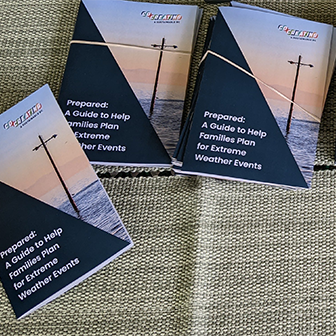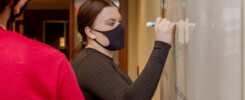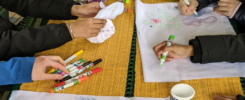When I think about climate change, my first thoughts are often of scary news articles that give us gloomy predictions ten, twenty or thirty years out. We are urged to focus on building towards a brighter future, rather than focusing on the here and now; we are asked to think globally, rather than locally. I myself came into the CCSBC program feeling pessimistic and discouraged by the litany of bad news, wondering what kind of project we could do that might make a difference.
It seemed like a fundamental shift in the conversation, however, when the Fraser Valley CCSBC cohort began discussing what we wanted to do as a project. Moving from the bigger picture to closer to home, we talked about what we had seen in our own backyards. Prior to meeting, we had all experienced a sweltering heat dome, heavy smoke and – during our time as a cohort – flooding. In reflecting on this, we decided we wanted our project to meet the needs of our local community and focus on the present. Having shared these collective hardships, we chose to do a project to help our communities prepare for extreme climate events – including the kinds we had already experienced.
We started by thinking about what kinds of climate events we had seen and expected to see across the Fraser Valley region and building off of our own knowledge. Amongst our group, we talked about community efforts such as water distribution and cooling centres in extreme heat and the availability of green space in our communities for heat protection. We talked about our own experiences – how we had leaned on and supported our neighbours to keep safe. We also had the chance to hear from community members and organizations about ways they were dealing with these issues and the importance of having information about safety during extreme climate events widely available. Despite the sadness and grief that carried through these conversations, there was also a thread of hope – that if we learn and lean on each other, we can get through this together.
Our finished project, the Prepared: A Guide to Help Families Plan for Extreme Weather Events booklet centres that hopeful and locally-oriented mindset. We wanted to offer helpful tips and tricks that would help us and others in our communities live well amidst these difficult times. Our colourful, illustrated booklet will be available in local libraries and we have had requests to distribute them elsewhere as well! It felt good that we were able to contribute to our community in a meaningful way and offer one more tool in our response to climate change.
My biggest takeaway from CCSBC is that when we feel like we are overwhelmed by a sense of helplessness in respect to climate change, we can connect with community to recharge our emotional batteries and rebuild a sense of hope. I would encourage other young folks who are feeling like they don’t know what to do about climate change to join CCSBC. Being with a group of peers where we could centre in on what we could do, right here and now, reminded me that every little bit counts and we have the power to fight climate change!

About the author:
Madeline (or M.P.) Gallard is 26 years old and has lived in various communities in BC, including Abbotsford, Victoria, Langley and Courtenay. Their undergrad was in political studies and they will be studying law in Fall 2022! They participated in the 2021-22 Fraser Valley cohort of the Co-Creating a Sustainable BC initiative.


